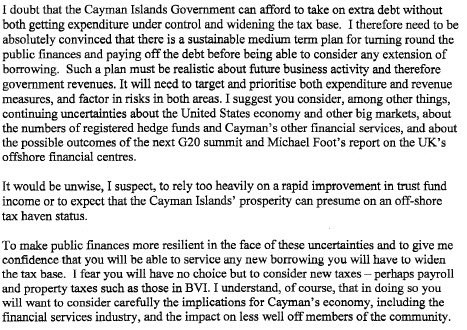Cayman is insolvent
September 2nd, 2009
September 2nd, 2009
No, you didn’t read that incorrectly. Cayman is insolvent, bust, broke, unable to pay its debts.
This is not a rumour, this is fact. This fact is confirmed by the speaking notes used by the Hon. McKeeva Bush for a meeting held with senior Cayman civil servants, government boards and private sector business leaders last Thursday, of which I seemed to be the first to secure a copy. The text is here, but I will also reproduce it separately on my blog in case Cayman take it down.
The following summarises the current state of play, all revenue in Cayman Island Dollars, which have a fixed exchange rate of CI$1=US$1.2:
|
Revenue, year to 30.6.09 |
487.4 |
|
Costs, year to 30.6.09 |
557.1 |
|
Apparent deficit |
-69.7 |
|
Add: Loss on state businesses |
-11.4 |
|
Overall annual deficit |
-81.1 |
|
Loans as at 30.6.09 |
598.0 |
|
Free cash balances 30.6.09 |
14.3 |
|
Free cash balances 25.8.09 |
-10.5 |
|
Overdraft facility |
-15 |
|
Expected cash deficit in September |
-48.6 |
|
Expected overdraft at 30.9.09 |
-59.1 |
|
Cash requirement in excess of limit |
-44.1 |
|
Facility now requested from UK |
372.0 |
|
Resulting total borrowing |
970.0 |
|
Borrowing as a proportion of revenue |
199% |
|
GDP 2004 |
1615.8 |
|
Borrowing as % GDP |
60% |
So desperate is the current crisis that the Caymans turned to the UK to cover September’s deficit, and have been politely told they may not borrow the necessary funds to pay wages and other commitments in that month. The letter saying so is here. It is also on my blog.
That means just one thing: Cayman is insolvent. It cannot pay its debts.
The UK has refused to lend the funds or let Cayman borrow because it does not believe it will cut government spending and it has seen no commitment by Cayman to raise taxes. And the UK makes it clear in no uncertain terms that is exactly what it thinks Cayman should do in the following key paragraphs:

I have the impression the author enjoyed writing those paragraphs, but look at what he is saying:
It’s hard to see how much more could have been said to make clear that Cayman’s business model is dead.
This is extraordinary. Bear in mind Cayman has the thirteenth highest GDP per head in the world, and the highest in the Caribbean. It has more multinational corporation subsidiaries than any other tax haven. It has more banks than any other tax secrecy jurisdiction, and more hedge funds too. And it is bust.
So what are they proposing to do? Unbelievably all proposed taxes are on ordinary people in Cayman:
That is grossly unfair on the poor in Cayman (the very people the UK says should be protected), shows no real broadening of the tax base but does, most of all, look like rearranging the deck chairs as the ship is sinking. Which is extraordinary by itself in two ways. First, for a place supposedly so clever this is a remarkably poor list of initiatives, and second it does of course say yet again that the vested interest of wealth is being protected.
The odd thing is that is not possible in this situation. If Cayman really is insolvent, and that seems likely, then it is very clear that law and order may fail, property rights may not be protected, and so on. Wealth, in other words, is under real threat and such is the size of Cayman activity I doubt much of it can get out in a hurry without causing massive instability.
So this really is a crisis at the heart of the whole tax haven / secrecy jurisdiction system. The totem of the offshore location is seeing its business model fail, and with it the whole edifice of offshore – including the whole hedge fund edifice that claims to be built around this small island, could fall with it.
This could be a Lehman scale failure.
And all for the sake of a few dollars. But a few dollars none the less the UK will not let them have.
Watch this unfold: if London sticks to its guns (and it should) then Cayman is over as a tax haven – as they themselves predict. The fall out will be enormous. The whole hidden economy could fall apart with it – and do not think that will not have onshore ramifications, because it will.